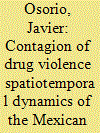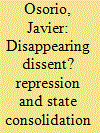| Srl | Item |
| 1 |
ID:
142490


|
|
|
|
|
| Summary/Abstract |
Why are some territories ravaged by intense levels of criminal violence while others are relatively peaceful? This research contributes to an understanding of the escalation and diffusion of drug violence in Mexico from 2000 to 2010 by formalizing the interactions between the state and organized criminals and by relying on a large database of event data containing more than 1.6 million observations. Results based on spatial econometrics provide evidence of the spatial diffusion of violence. In congruence with the theoretical expectations, the results show that the disruptive effect of law enforcement is an important catalyst for the intensification of violence between criminal organizations, especially when deployed in areas hosting a high concentration of criminal groups. This relationship holds for a broad menu of violent and nonviolent law enforcement tactics. The analysis also reveals that other broadly held factors (international, geographic, and socioeconomic characteristics) have a modest effect on the dynamics of drug-related violence.
|
|
|
|
|
|
|
|
|
|
|
|
|
|
|
|
| 2 |
ID:
158215


|
|
|
|
|
| Summary/Abstract |
Does violent repression strengthen the state? In this article we explore the legacies of repression by the Mexican government on subsequent patterns of state consolidation. We investigate how a particular form of state repression, forced disappearances of alleged leftist dissidents during the ‘Dirty War’, had path-dependent consequences for different dimensions of state capacity nearly 50 years later. To do so, we rely on data gathered from suppressed Mexican human rights reports of forced disappearances which, to our knowledge, have not been analyzed by social scientists before. Controlling for a rich set of pre-disappearances covariates we find that forced disappearances are positively correlated with contemporary measures of fiscal, territorial, and bureaucratic capacity. However, historical forced disappearances do not help the state to provide security, to consolidate its monopoly over the use of force, or to provide welfare-related public goods in the long run. Moreover, disappearances are negatively correlated with various measures of trust in the government. Forced disappearances committed by the state appear to have long-term yet heterogeneous effects on state consolidation.
|
|
|
|
|
|
|
|
|
|
|
|
|
|
|
|